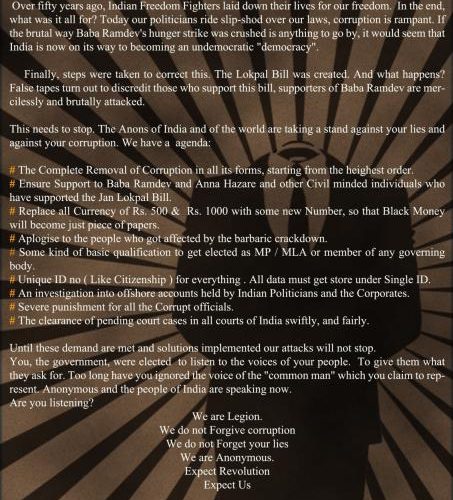On the midnight of 5th June 2011, Indian police violently cracked down on a peaceful group of protesters who had convened together against corruption and untaxed money stashed away in foreign tax havens (referred to as “black money” in India). On the 7th of June, Anonymous announced “Operation India” on Twitter, kicked off by the defacement the website of the Indian federal government’s nodal IT agency, the NIC, and the release of a list of demands. The demands consisted of:
- The Complete Removal of Corruption in all its forms, starting from the heighest(sic.) order.
- Ensure Support to Baba Ramdev and Anna Hazare and other Civil minded individuals who have supported the Jan Lokpal Bill.
- Replace all Currency of Rs. 500 & Rs. 1000 with some new Number, so that Black Money will become just piece of papers.
- Aplogise(sic.) to the people who got affected by the barbaric crackdown.
- Some kind of basic qualification to get elected as MP / MLA or member of any governing body.
- Unique ID no ( Like Citizenship ) for everything . All data must get store under Single ID.
- An investigation into offshore accounts held by Indian Politicians and the Corporates.
- Severe punishment for all the Corrupt officials.
- The clearance of pending court cases in all courts of India swiftly, and fairly.
While I have seen many, if not most, Anonymous actions in a positive light, this particular list of demands sounded naive and jarring. The demand that popped out immediately as being really contrary to “Anonymous” was the one about the Unique Identification Number. The government of India has been trying to roll out a national ID number system, something that can be possibly used to track citizen activity. By demanding a “Unique ID no […] for everything” Operation India seemed to support that goal explicitly, ignoring the fact that this would mean an end to anonymity, at least in the eyes of the state, and whomever the state decides to share the data with.
Of course, as Gabriella Coleman points out, Anonymous’s participatory structure makes it possible for the occasional potentially self-defeating action to emerge out of the collective, but that seems to self-correct, as seen in the instance when Operation India, in response to negative reaction to a separate incident, decided to refrain from defacing Indian government websites. However, for this particular demand list, no further revisions were made. It may be entirely possible that Operation India disbanded before any revision could emerge (the last post on the Twitter account is dated 11th June), but even then I feel that this incident highlights the risk that at certain times, Anonymous operations can become unguided missiles, with the potential of taking down the very principles it (or a majority of it) stands for. But again, this is a real risk for almost every participatory process, especially those with a low barrier to entry.


